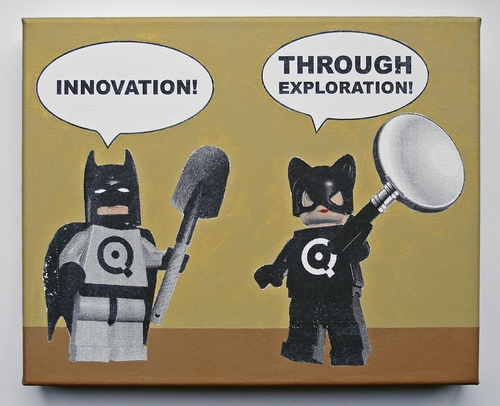 I’ve been thinking about conferences recently. And unconferences. And a new kind of get-together that I don’t quite have a name for. Let me explain how I got to this no-name-as-yet idea.
I’ve been thinking about conferences recently. And unconferences. And a new kind of get-together that I don’t quite have a name for. Let me explain how I got to this no-name-as-yet idea.
I used to sign up for a lot of workshops and school-supported classes — really anything that my school would suggest. That was all BC, which for me means Before Children. Then I got a little swamped by the diapers, nap schedules and childcare arranging that got added to the regular teaching work.
I have to admit that I really stepped back and even out of the conference/workshop/ professional development world. Not a good thing, but probably not unusual for teachers-parents with young kids. I didn’t stop reflecting on what I do, or talking about it (just ask my husband), but I did narrow my audience severely.
In the past four or five years I’ve reemerged from my toddler fog and rejoined the conference world. Conferences always promise A LOT. They have big idealistic titles like “Innovation,” “Expanding Horizons,” “Unlocking Potential,” or “Schools of the Future: Embracing the Eudcational ReNAISsance.” I mean, wow. That’s quite a bit to get out of a weekend or a few days. Even if they aren’t cheap, if that’s what you’re getting, how can you go wrong??
My conference scorecard
Of course I’m not really using a scorecard — for me they get in the way of enjoying the game. However, since I can’t go to everything, I do have to decide what is worth my time and maybe my money. Here’s how I’ve been thinking about it:
– Where is the conference? For me closer is better. Time is more valuable than money, and time usually equals babysitting dollars or the even more costly guilt about being missing-in-action on the weekend. Lucky for me, I live in Philadelphia and a lot of good education conferences come to me. (I can only assume that they’ve heard this lowers my overhead, makes things easier on my family life, and they’re happy to help out.) This means I can conserve time and resources and participate in some great professional development.
– How much does it cost? Registration, travel, food, lodging, time, child-care.
 – What is the topic? Given that I can’t do it all (and isn’t this true in so many areas), I like to attend events that I suspect will be useful and that are just at the edge of my understanding. If they are too much beyond me, I can’t make use of the information. If there is nothing new, then I can spend my time doing something else.
– What is the topic? Given that I can’t do it all (and isn’t this true in so many areas), I like to attend events that I suspect will be useful and that are just at the edge of my understanding. If they are too much beyond me, I can’t make use of the information. If there is nothing new, then I can spend my time doing something else.
– What’s my record so far? I don’t know about anyone else, but even with these criteria in mind, it’s not as if I have a perfect record. However, I have yet to attend an entire conference that I thought was a total dud. I’ve certainly been to some sessions that were not what I expected, but even at the individual session level, I’d have to say that I’m over .500 (baseball season is starting, so I’m moving right into batting-average metaphors along with the baseball fiends in my class).
– The post-game analysis: Did a particular conference I attended during its last sweep through Philadelphia make good on its promises? And what does it mean for a conference to have been worth it? As I said, conferences often have big and idealistic titles. Do they make good on those? Probably not. Does that make them bad conferences? Definitely not. Why? Because, what they also promise and do make good on is a large choice of session and plenty of opportunity to make connections with interesting people. In my opinion, that’s not something to sneeze at.
Let’s Compare
I like evaluations that offer comparisons, so I should explain that I’ve personally been attending a lot of edcamps and unconferences lately. They are free and don’t have such lofty titles. They promise to put interested people together at a particular time and place, be friendly about it, and then get out of the way and give people time to have conversations. While they may not have the big goals and sparkly adjectives of nationally promoted gatherings, I find the price is right, they frequently deliver on the people and friendly parts, and if attendees find they are not enjoying themselves, they are free to “vote with their feet” and find some other way to occupy their Saturday.
Case Study #1
The most recent conference I attended was EduCon in late January. It’s always at SLA in Philadelphia. So while it wasn’t free in terms of dollars, my school generously covered my registration, and the time and location were good. I have a very capable husband, family in the area, and a good babysitter; it’s a trifecta of sorts. So, was EduCon worth it?
 First, what do others say? I’ve been trying to read what others have written about their experiences at EduCon. Shelly Krause (@butwait) keeps an unoffical collection of blogger reflections here. There is a real range. Some people can’t get enough of it. Other attendees found the conference not different or groundbreaking enough. I guess it comes down to what you went in expecting. As I said above, I don’t expect perfection, and yet I don’t think that I have low expectations. I expected to hear some new ideas. I also expected to have to bring something to the discussion myself. Not all conferences are this way, but EduCon is more like a potluck. It only works if everyone brings something to the party. You can show up empty handed and everyone is pretty friendly, but most attendees come with their casserole, dip, or whatever.
First, what do others say? I’ve been trying to read what others have written about their experiences at EduCon. Shelly Krause (@butwait) keeps an unoffical collection of blogger reflections here. There is a real range. Some people can’t get enough of it. Other attendees found the conference not different or groundbreaking enough. I guess it comes down to what you went in expecting. As I said above, I don’t expect perfection, and yet I don’t think that I have low expectations. I expected to hear some new ideas. I also expected to have to bring something to the discussion myself. Not all conferences are this way, but EduCon is more like a potluck. It only works if everyone brings something to the party. You can show up empty handed and everyone is pretty friendly, but most attendees come with their casserole, dip, or whatever.
One of the criticisms that I have heard and read is that the theme was Innovation and yet the same discussions were happening and the same complaints were aired. I don’t doubt that some of that is the case. And I would add that the attendees at this conference are generally not people who haven’t done a lot of thinking already. The low hanging fruit is gone.
I found in many of the sessions I attended that people were honestly wrestling with how to do what is right by their students and keep their jobs. Some people were really ready to leave the box behind and others felt more tied to it. In the session that I co-presented, our topic was in fact being a risk-taking teacher. We did not claim to have answers on how to be truly innovative; we did have a lot of productive and thoughtful conversation about what feels risky, what kind of support people need to feel comfortable in taking a risk, and how we might go about analyzing risks.
To sum up: I found the conference worth my time and my school’s money, and there were sessions I attended that were not valuable. Did I find INNOVATION (all caps, deep voice, echo chamber)? Not necessarily. Did I find people with whom I really like to talk and think? Yes. Did I come away with new ideas and energy? Yup. I didn’t expect that because the theme was innovation that I would be handed the blueprint to innovation or that only innovative people would be allowed to attend.
I know it’s easier for me to offer a very generous analysis of EduCon since I took a $4, 25-minute train ride to get there. Time and money matter to me and everyone else.
Last year I went to ISTE, which was also in Philadelphia. It’s not free, but again my school covered registration and a little more for babysitting. So a no-brainer. However, this spring ISTE is in San Diego. So, let’s see: registration $, flight $$, hotel $$, food $, extra childcare and babysitting while I am gone $$, not to mention mom-guilt for going to San Diego without my kids during their vacation. That’s approximately $$$$$$$$ (+guilt, which is priceless).
I could ask my school to help cover some of that. However, as I was talking with teacher and edtech enthusiast Hadley Ferguson (@hadleyjf) about it, she made some good points. First, it’s a lot of money (well, this was not her best point, but she got more thoughtful as she went on). Second, she said that she didn’t need more ideas so much as time to implement the ones she already has. Isn’t that the truth!
Let me be clear: I am sure I would find new and more ideas at ISTE this June. And yet, I haven’t even made sense or sifted through all the ones I got last year — or all the ideas from the many edcamps I’ve attended. In fact, I have some ideas that I’ve been trying to figure out how to implement for a long time; I am talking years. Some of the ideas haven’t happened because they aren’t very good, but I have one or two that I’m pretty sure would be really great if I could get the big framework and some of the logistics figured out.
The PD I really need right now
So I got to thinking about what kind of PD I really need at the moment. I’ve been attending conferences and edcamps, what next? Maybe it’s time to take a step back, temporarily, to reflect and put some ideas into action? Here’s what I decided.
- I need dedicated time, duh, and not an hour here or there, but a whole day or days.
- I need to do some pre-sifting of ideas before this dedicated time begins.
- I need an action-oriented group of colleagues who want to meet and collaborate. A lot.
- I need a space with good wifi, power sources, and proximity to food, water, and bathrooms.
So here’s my no-name-yet idea:
– I don’t go to ISTE, however great it will certainly be.
– I do meet with some amazing, interesting, and interested teachers during that same time.
– We bring ideas that we want to evaluate and/or work up into units/lessons/game-changing events.
– We do not have presentations or panels.
– We meet in groups and work on whatever projects grab us.
– We do not watch powerpoints.
– We meet some more and revise what we did.
– We don’t move on to something else before we have finished what we have started.
– We share this with whoever cares to listen/read.
– Some of those ideas — the ones we have so many of — turn into action.
Who’s in?
I’m thinking we gather in the Philadelphia area around the time of ISTE (so we don’t feel left out). To continue the potluck theme, I’ve talked to my division head and she is willing to donate space. I have ideas (no guarantee they will be the ideas others are interested in) and energy to commit. I am also a decent baker and can order pizza like a pro.
What can you contribute?
Images:
Thinking, Flickr CC
Wendy Eiteljorg
Latest posts by Wendy Eiteljorg (see all)
- Conferences, unconferences, educamps – Now what? - March 23, 2012



Hey, Wendy- I concur with your analysis of conferences. They are increasingly expensive and now that airfare/transportation cost are skyrocketing will soon be too costly for most teachers to attend. The ROI just isn’t that high and really the friendships/connections made are the greatest value to attending in the first place.
As for your idea, I’d love to be part of your collaborative work day, but I doubt I can get back to Philly before next January. That said, I’d be happy to be on call as a resource for visible thinking, and I’d love to perhaps participate virtually as much as the tech allows–though I think virtual attendance at this type gathering might be somewhat counter-productive for those in attendance. At any rate, I’m interested. If I can be of help, let me know.
Philip,
Hi. Hope all is well with you. I agree the friendships and connections are a big part of attending conferences of any sort.
I just attended EdCampSS (social studies) and thought it was a great gathering. Not too many people, but a lot of discussion and sharing of practical ideas.
I’ll keep you posted on the planning and let you know how things progress. It would be great if you could stop by virtually!
Wendy,
Love your idea and I”m so glad Buffy shared it. It reminds me of several things–that we need the support of others sometimes to hold ourselves to meeting our goals, that we learn well in a supportive community. Where I live (probably in Philly too), we have these office spaces you can rent for a day or hour or month–and for some reason your idea sort of reminds me of that–creating your own Google space to create! Anyway, I love it! I’ve been thinking about something like a think tank myself or some way to get together with other educators over the summer and talk ideas. Your post encourages me to refine my thinking on that.
Good luck!
Carolyn,
Thanks for reading and commenting! I hope you get your plan going as well. Keep me posted. I know the end of the school year will get crazy busy, but I am going to try to keep this idea from falling of the front burner (or at least off the stove entirely). I think getting together in this way would be great.
Good luck to you too.
Count me in, Wendy! We are thinking of doing something sort of like it at edcamp Philly for those who have been to multiple edcamps or who want to focus on creating one thing – a lesson, unit, whatever. I wonder if sometime at the end of June might work – not too far out from school, but with some refreshment. Thanks for keeping me in the loop!
HI Hadley, I hope to come to edcamp Philly. I think the end of June might be a good time as you say. I’ll keep you posted.
Wait a minute here… are you talking about an edcamp…lesson planning? Because I think that would be incredible and supportive and gosh darnit, curriculum shattering!
Christina,
I like your name for it! I couldn’t come up with one myself. I was thinking more along the lines of unit planning or even total classroom shift planning! Go big or go home, I say. I hope you are interested in being involved.
Wendy,
I am very interested in being part of the conference. I teach US history to sophomores and juniors at Pitman High School in southern New Jersey. I have been playing around with technology in the classroom for the past few years but I am looking to turn my classroom upside down next year and get to the heart of becoming a connected classroom. I would be interested in talking about potential classroom portals like Edmoto or Wikispaces as well as blogs and collaborative project ideas. I would love to talk with colleagues to learn the road map that will work best for my students and I. Keep me in the loop! Thanks.
Kevin,
I am glad you are interested. Please put your name on the google doc which is linked to “contribute” in the last line of the post. I hope you will join the conversation. It sounds like you have a lot of ideas. I have found Edmodo to be a great tool for my class this year.